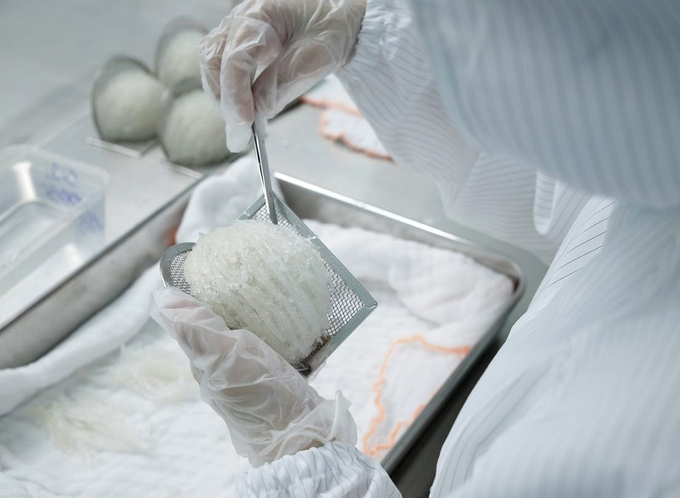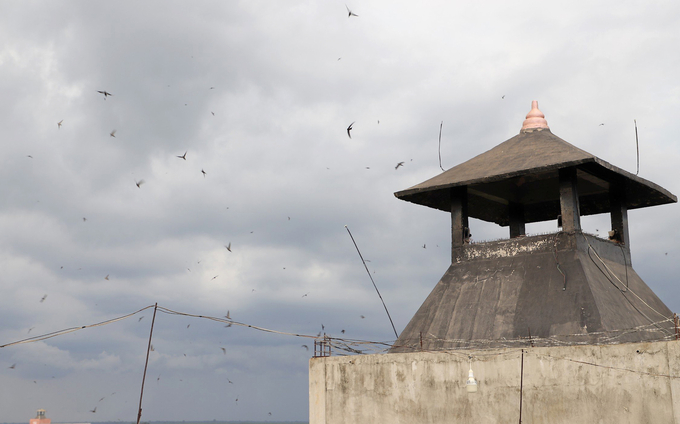June 19, 2025 | 03:41 GMT +7
June 19, 2025 | 03:41 GMT +7
Hotline: 0913.378.918
June 19, 2025 | 03:41 GMT +7
Hotline: 0913.378.918

Processing exported bird's nests at Vietnam Quoc Yen Company. Photo: Son Trang.
Currently, four countries are allowed to export bird's nests to China: Vietnam, Thailand, Malaysia and Indonesia.
According to Mr. Hong Dinh Khoa, Chairman and CEO of Vietnam Quoc Yen Joint Stock Company, among these four countries, Thailand does not focus heavily on the Chinese market. In fact, in the entire year of 2023, Thailand's bird's nest industry exported less than 500 kilograms of bird's nests to this market.
Meanwhile, Malaysia and Indonesia place great emphasis on the Chinese market. These two countries have had well-established bird's nest industries for a long time and currently hold the largest production volumes in the world. Despite their large output, they have virtually no domestic market, so almost all harvested bird's nests from Malaysia and Indonesia are exported abroad.
Due to the high export pressure, Malaysia and Indonesia have recently focused on competing through pricing. To make sales, they are willing to lower their prices, which has significantly driven down global bird's nest prices. According to Mr. Le Thanh Dai, President of the Vietnam Bird's Nest Association, in 2021, the price of bird's nests in China was 12.100 CNY/kg. By 2022, it had dropped to 9.000 CNY/kg, and continued to decrease to 8.000 CNY/kg in 2023.
In contrast to Malaysia and Indonesia, Vietnam's bird's nest industry has a domestic market. This stable domestic market helps relieve the pressure on exports for Vietnam's bird's nest industry, but it also causes the price of raw bird's nests in Vietnam to be higher than those in Malaysia and Indonesia. This creates disadvantages for Vietnamese bird's nests when competing in the Chinese market.
In this context, Vietnam's bird's nest industry needs to continue focusing on its strengths to enhance its competitiveness.
According to Mr. Hong Dinh Khoa, Vietnam's bird's nests are highly regarded by discerning and knowledgeable consumers due to their distinct fragrant and musky flavor. Another advantage is that Vietnam's island and natural cave bird's nests have long been renowned worldwide. In China, connoisseurs have a certain appreciation for Vietnamese bird's nests.
As a result, when Vietnamese bird's nests were officially exported to China, they sparked interest and curiosity among Chinese consumers, who wanted to try and see if they were truly as delicious as claimed.
Mr. Khoa believes that this curiosity is an advantage that allows Vietnamese bird's nests to reach Chinese consumers even in their early stages in the market. This presents a great opportunity for Vietnamese bird's nest businesses to penetrate the Chinese market by delivering on their quality promises and providing professional sales services.

National standard birdhouses are the foundation for establishing a supply chain of raw materials for export processing factories. Photo: Minh Sang.
However, a current issue is that the proportion of raw bird's nests meeting export processing standards is not high. The reason is that domestic bird's nest farmers in recent years have mostly focused on maximizing production, paying little attention to the quality of raw bird's nests.
In response to this situation, to improve the percentage of export-quality bird's nests, Mr. Le Thanh Dai shared that the Vietnam Bird's Nest Association has issued criteria for recognizing national-standard birdhouses. According to these criteria, birdhouses with high production, where Grade A bird's nests account for 30% or more, will be considered for inclusion in the Association's list.
The list of national-standard birdhouses will serve as the foundation for creating a supply chain of raw materials for bird's nest export processing factories. To sustainably and long-term export bird's nests, companies must establish a supply chain that ensures both quality and traceability.
Therefore, the national-standard birdhouses recognized by the Association will be a reliable source for exporters to connect with and purchase products. This, in turn, will help the bird's nests from these certified houses achieve better and more stable prices.
Translated by Phuong Linh
/2025/06/17/2344-1-131758_261.jpg)
(VAN) Amid tariff risks and growing trade barriers in the U.S. market, Australia is emerging as a promising destination to sustain the growth momentum of Vietnam's shrimp exports.
/2025/06/17/2013-1-nongnghiep-112009.jpg)
(VAN) This notable growth trend reflects the global taste for fresh, nutritious fruits and the expanding use of lychees across various sectors.

(VAN) The political and cultural insulation of Japan’s beloved grain is falling apart, and experts warn the country’s relationship with the staple will have to adapt.

(VAN) Noting risks, report examines impacts of avian influenza, changing trade patterns since 2022, fish fraud, and shipping industry’s net-zero goals.

(VAN) Mr. Tran Quang Bao, General Director of the Forestry and Forest Protection Department, met and worked with the International Wood Products Association to promote cooperation in the field of timber trade.

(VAN) China's outbound shipments of rare earths in May jumped 23% on the month to their highest in a year, though Beijing's export curbs on some of the critical minerals halted some overseas sales.

(VAN) To sustain capital flow, administrative reform alone is not enough; what farmers truly need is an ecosystem where both government and businesses grow together in support.